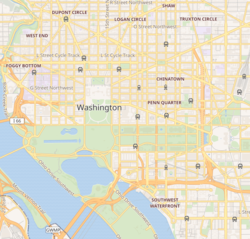Armenian Genocide Museum of America
Parts of this article (those related to the physical museum building) need to be updated. (April 2017) |
 Planned location of the Armenian Genocide Museum of America | |
| Location | Washington, D.C., |
|---|---|
| Coordinates | 38°53′53″N 77°01′57″W / 38.898°N 77.0324°W |
| Type | Armenian Genocide |
| Public transit access | |
| Website | www |
Armenian Genocide Museum of America (AGMA) is a proposed Armenian museum in Washington, D.C., United States, run by the Armenian Genocide Museum and Memorial Inc. (AGM&M). The project was launched in 2000 and is yet to be finalized.[1]
Concept and organization
[edit]The idea to dedicate a building for commemorating the Armenian genocide was launched by Hirair Hovnanian and Anoush Mathevosian.[2]
The project was run by the Armenian Assembly of America (AAA) from 2000 to 2003. In November 2003, the project was transferred to the Armenian Genocide Museum and Memorial Inc. (AGM&M), with the Armenian Assembly of America given a trusteeship position.
Location
[edit]The Armenian Genocide Museum will be housed in the former National Bank of Washington building, built in 1926 with a historic Interior and located on the southeast corner of 14th and G Streets, N.W., in downtown Washington, D.C. The building was purchased for $7.25 million, in addition to four adjacent properties, costing a total of $20 million. The site is two blocks from the White House and three blocks north of the National Mall.[3][4]
Funding
[edit]The main contributors as of September 2006[update] were:[5]
- Armenian American philanthropist Gerard Cafesjian and the Cafesjian Family Foundation (CFF) – $14.4 million in funds and properties.
- Anoush Mathevosian – $3.5 million
- Hirair Hovnanian – $1.5 million
The official website of the museum sets the opening date as 2011.[needs update][6] The project however has been marred by disagreements and a litigation between Cafesjian and the Cafesjian Family Foundation on the one side, and the other trustees on the other side.[7][8] A trial was held in Washington, D.C. between March 9 and 29, 2011 before U.S. District Judge Colleen Kollar-Kotelly. After hearing witnesses and evidence, she issued a 190-page opinion and an order to the Armenian Genocide Museum and Memorial (AGM&M), Inc. to transfer the grant property back to the Cafesjian Family Foundation (CFF).[9]
Temporary exhibits
[edit]While still in its formative stage, the Museum participates in temporary exhibits.[10]
See also
[edit]References
[edit]- ^ Parker, Loanne (28 March 2014). "Which Museums Show Real Promise?". Washington Post. Retrieved 8 April 2015.
- ^ Stephen Kinzer (April 24, 2002). "Plans for Museum Buoy Armenians And Dismay Turks". New York Times.
- ^ Sean Madigan (January 30, 2004). "$100 million museum takes control of site". Washington Business Journal.
- ^ Marilyn Henry (April 12, 2008). "New Armenian Genocide museum". Jerusalem Post.
- ^ Armenian Reporter about the donors to the project – page 3 Archived November 28, 2010, at the Wayback Machine
- ^ Official website about the projected opening of the museum
- ^ Michael Doyle (February 6, 2009). "Battle over Armenian genocide museum in D.C. gets nasty". McClatchy Newspapers.
- ^ Stephen Manning (October 12, 2007). "Dispute roils plans to build museum". Associated Press.
- ^ Vincent Lima article in The Armenian Reporter: AAA leaders continue to hold up Armenian Genocide museum Archived April 8, 2011, at the Wayback Machine
- ^ "'Iconic Images of Armenian Genocide' to be exhibited in Washington D.C." Armenian News Agency. 8 April 2015. Retrieved 8 April 2015.
External links
[edit]- Armenian Genocide Museum of America official website
- "From National Bank to National Museum", video tour by The Washington Post


